Search the Special Collections and Archives Portal
Search Results

Transcript of interview with Harry Kogan by Barbara Tabach, January 12, 2016
Date
Archival Collection
Description
With a liveliness of a man decades younger, Harry Kogan looks at his 100th birthday with cheer and satisfaction. Born March 11, 1916 to poor Russian immigrant parents in the Jewish ghetto of Philadelphia, Harry vividly recalls walking to school shoeless, with no hat or no raincoat. A treat would be his mother handing him ten-cents to go to the theater and enjoy a silent movie. After graduating from high school in 1933, Harry quickly took one of the rare jobs available in a garment manufacturing company where he worked his way into being a skilled and valued fabric cutter-a job that paid $35 a week. Harry was raised with two brothers and lived in Philadelphia for the first 91 years of his life before moving to Las Vegas. One of his brothers learned the refrigeration business while enlisted in the Navy and after the war formed a commercial refrigeration business named Kogan Brothers. Harry is a philosophical and philanthropic man. He was slow to retire and traveled the world, took classes and donated to his favorite causes; among which are the Boys Town Jerusalem and the Jewish Federation of Las Vegas. He sat for this interview to honor his Jewish roots, to share his life experiences and spending the past years in Las Vegas.
Text

Meeting minutes for Consolidated Student Senate, University of Nevada, Las Vegas, December 07, 1982
Date
Archival Collection
Description
Text
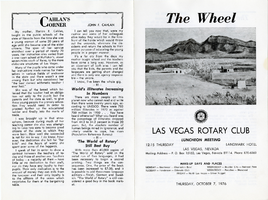
The Wheel Las Vegas Rotary Club newsletter, October 7, 1976
Date
Archival Collection
Description
Text
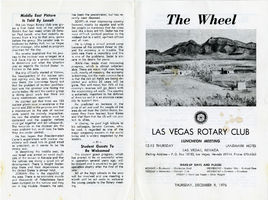
The Wheel Las Vegas Rotary Club newsletter, December 9, 1976
Date
Archival Collection
Description
Text
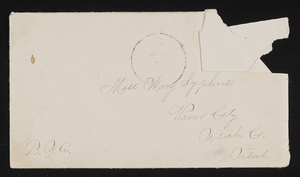
Letter and envelope from Nellie Harrison, Kanab, Utah to Mary Etta Syphus, Provo City, Utah
Date
Archival Collection
Description
From the Syphus-Bunker Papers (MS-00169). The folder contains an original handwritten letter, a typed transcription of the same letter, the original envelope with the stamp removed, and a copy of the original letter.
Text

Transcript of interview with Jack Bullock by Julie Domonkos, March 15, 1981
Date
Archival Collection
Description
Text

Transcript of interview with Dr. Holbert H. Hendrix by Keith Thomas, February 20, 1979
Date
Archival Collection
Description
On February 20, 1979, Keith Thomas interviewed Dr. Holbert H. Hendrix (born 1914 in French Lick, Indiana) about his life in early Las Vegas, Nevada. The interview takes place at the University of Nevada, Las Vegas in Room 312 of the Education Building. Dr. Hendrix first discusses his personal background and interests, as well as his occupational background in teaching. The two discuss changes at the University of Nevada, Las Vegas, including construction, when the university began awarding degrees, and Dr. Hendrix’s reasons for moving to Las Vegas. Dr. Hendrix then describes changes to the Strip and how the hotel industry has changed since he first arrived in Nevada. The two briefly discuss how problems with prostitution may have increased since Dr. Hendrix arrived in Nevada. The interview concludes with Dr. Hendrix contemplating new problems that may arise in Las Vegas as a result of an expected population boom and his hopes that the Nevada state government would invest more into funding for education.
Text
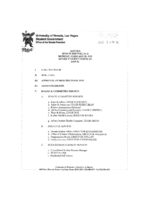
Meeting minutes for Consolidated Student Senate University of Nevada, Las Vegas, February 28, 1995
Date
Archival Collection
Description
Text
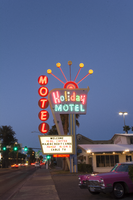
Photographs of Holiday Motel, Las Vegas (Nev.), March 1, 2017
Date
Archival Collection
Description
Site address: 2205 S Las Vegas Blvd
Sign owner: Calcaterra Family and Trust
Sign details: Holiday Motel was built-in 1952 - a one acre lot with 14,238 sq. ft. of living space.
Sign condition: 2 - The neon is not working completely, majority of the lights have not been repaired or maintained. The actual paint has shifted from a brilliant red into a subdued salmon rustic color from exposure of Sun/UV and wind.
Sign form: Pole mounted sign with reader board
Sign-specific description: The Holiday Motel is an animated sign that is part of the mid-century and Googie design. The color scheme is mostly a primary color palette of red, blue and yellow. The neon holiday typography is the only element of the sign that differs from the palette, but only when it is lit up. Instead the holiday font illuminates multiple colors to continue the clown theme effect. The sign is in true Googie fashion that popularized roadside signage from 1950s-late1960s. It is in the style of a pylon sign with a directional arrow that points towards the motel entryway. When the sign lights up the directional arrow uses a chaser to animate the arrow and its design with incandescent bulbs. The directional arrow surrounds the holiday motel square shaped portion of the sign. On the top portion of the sign is a rainbow design with five metal rods with circles at the end shooting out of the rainbow. These five rods when lit up in the evening are animated as well and produce a wave motion. On the side of the sign are separate white letters encased in red circles and are designed vertically reading the word motel.
Sign - type of display: Neon, incadescent
Sign - media: Steel and plastic
Sign animation: Animation with upper circles/rods chasing from one to the next.
Sign environment: Property is near other motels and the Stratosphere.
Sign manufacturer: YESCO
Sign - date of installation: c. 1952
Sign - thematic influences: This sign is completely influenced by the 1952 Holiday Inn sign. Both are include an animated chaser direction arrow. The initial design is completely replicated from the Holiday Inn sign. The only difference is the five animated rods in Holiday Motel and where Holiday inn sign has a star instead of a rainbow at the top of the sign. The main difference is that the Holiday Motel sign includes a side panel with the word motel spelled vertically.
Sign - artistic significance: Artistic theme includes a circus theme, but also involves the Googie roadside sign that channels the space age landing beacon. As for majority of signs in 1950s-1960s the sign itself was quite colorful and in the shape of a pylon sign to grab the travelers attention.
Survey - research locations: roadarch.com, assessor's website
Survey - research notes: There was hardly any information pertaining to the history of the Holiday Motel sign. The property was originally called the Holiday Inn Motel but had to change its name in the 1960s due to the large Holiday Inn chain.
Surveyor: Gisselle Tipp
Survey - date completed: 2017-08-25
Sign keywords: Neon; Incandescent; Steel; Plastic; Chasing; Reader board; Pole sign
Mixed Content
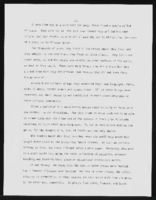
Untitled unpublished manuscript by Roosevelt Fitzgerald
Date
Archival Collection
Description
From the Roosevelt Fitzgerald Professional Papers (MS-01082) -- Unpublished manuscripts file. "Injustice Blacks Have Suffered…" ending with Naomi Long Madgett's poem "Midway."
Text
